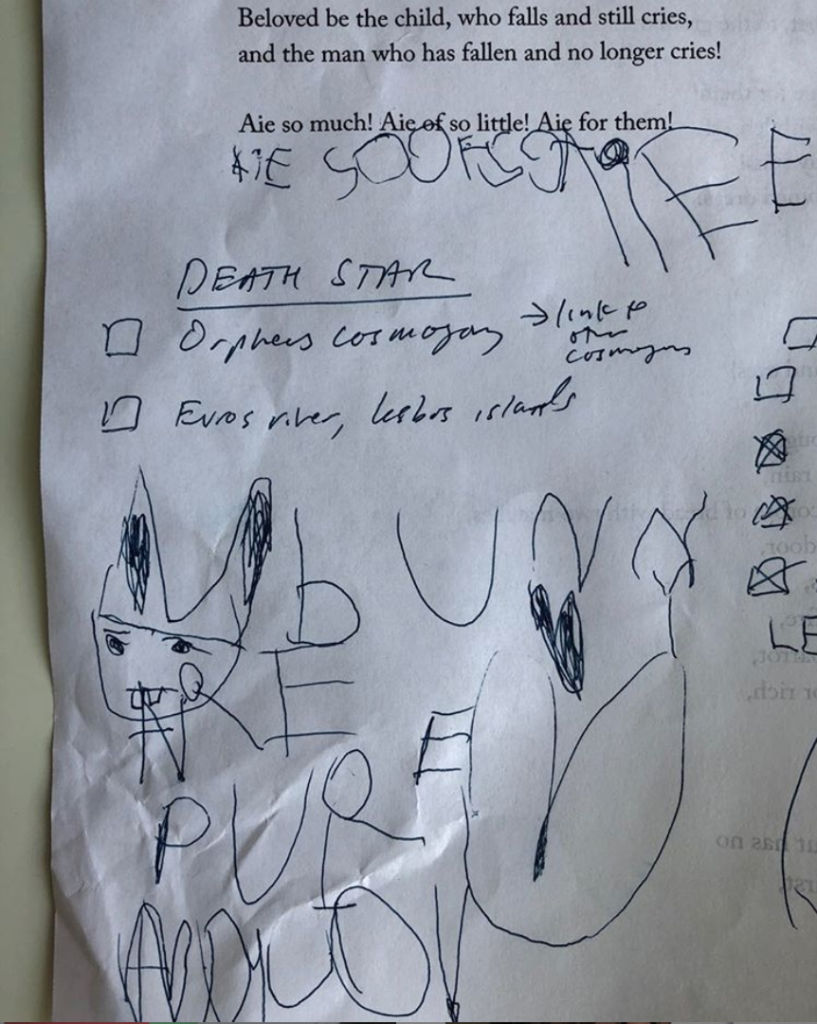I was showing YC these old poems I did when I was pretending to be a translator from classical Chinese, and she said this first poem perfectly encapsulated what it was like to be alive right now. Here is an inadvertent pandemic/social collapse diary written by Li Hou Zhu, in my opinion the most translatable classical Chinese poet
to the tune of
Crow Night Sung (I)
Li Hou Zhu (937-978?)
Last night: wind and rain against the curtains,
Sa, Sa—the sound of fall.
The wick is out, the fifth watch finished
but I am still thinking, propped up by this pillow, thinking.
The days fall slowly out of this world, water from a river.
My life wavering as though inside a dream.
The only stable road is to the wine rack.
Otherwise, why walk.
It was written a thousand years ago by someone who also dealt with state failure through massive wine consumption. I had published a few translations like fifteen years ago in Fascicle, an amazing journal that no longer exists, so I thought I would resurrect them on my ’90s-style blog here. There are more poems below by Li, once called the Chopin of Chinese poetry. To be honest, I think most Tang Dynasty poetry doesn’t translate very well, and Li Hou Zhu, a temporal resident of the so-called Southern Song Dynasty, reads better in English since he is credited as inventing the first person poem in Chinese. I have always imagined him as sounding like a combination of the Milton of the sonnets, plus a little Larkin. (The so-called old songs, like the yue-fu ballads, I’ve always pegged as Robert Johnson but slightly more intense, less libidinal.) When I was young, I had wanted to publish a book of Li Hou Zhu translations; as it happened, I ended up incorporating some of his poems into the end of my poetry book, Juvenilia. There are some more experiments in translation below, all of which I did with my mother in my early twenties.
/\/\/\/\/\/\/\/\/\/\/\/\/\/\/\/\/\/\/\/\/\/\/\/\/\/\/\/\/\/\/\/\/\/\/\/\/\/\/\/\/\/\/\/\/\
to the tune of
Wave Pure of Sand (I)
Li Hou Zhu (937-978?)
These memories that can only be grieved for.
This scene I must face, this scene so hard to get rid of.
The fall wind in the garden. The moss taking over the steps.
The screen hanging beaded over the closed door—
Why open it. Who comes.
My gold sword sunk into ground.
My spirit lost among the long weeds.
Then in the cool night. Then in the quiet sky. Then the moon blossoming open.
My mind goes back to the jade palaces, those old hallways
but now only the light glows hollow on the waters of Ch’in-huai.
/\/\/\/\/\/\/\/\/\/\/\/\/\/\/\/\/\/\/\/\/\/\/\/\/\/\/\/\/\/\/\/\/\/\/\/\/\/\/\/\/\/\/\/\/\
to the tune of
Beautiful Lady Yu
Li Hou Zhu (937-978?)
The tower again. Last night again. Again the wind from the east.
The empire is lost. And I would rather not look back at the moonlight’s center:
The jade hand-rails are still engraved. Only the owner’s face has changed.
You ask how much—how much sorrow?
Like a river in spring, the waters swell to the east.
/\/\/\/\/\/\/\/\/\/\/\/\/\/\/\/\/\/\/\/\/\/\/\/\/\/\/\/\/\/\/\/\/\/\/\/\/\/\/\/\/\/\/\/\/\
to the tune ofCrow Night Sung
Li Hou Zhu (937-978?)
No words my own, nothing to say, climbing alone the west.
Moon bent like a hook.
Loneliness beneath Wu-Tong trees.
All of fall—cold and locked in court chambers…
Cannot cut it cleanly off,
or even order it without the mess:
This is the sorrow of leaving.
Another taste of my heart.
/\/\/\/\/\/\/\/\/\/\/\/\/\/\/\/\/\/\/\/\/\/\/\/\/\/\/\/\/\/\/\/\/\/\/\/\/\/\/\/\/\/\/\/\/\
to the tune of
Looking South
to the River (III)
Li Hou Zhu (937-978?)
So many regrets… Last night in my dream:
those old days, touring the grounds at Song Yen
where cart moves like river, the horse like a dragon.
Flowers and the moon. All that was spring—
/\/\/\/\/\/\/\/\/\/\/\/\/\/\/\/\/\/\/\/\/\/\/\/\/\/\/\/\/\/\/\/\/\/\/\/\/\/\/\/\/\/\/\/\/\
Drink Wine (V)
Tao Qian (Tao Yuan-Ming, 365-427)
I made a house in the house of men, but left out
the noise of horse and wheel. You ask how
it can be? My heart is far and makes
this place farther. Once, when I picked a sprig
of chrysanthemum, through the eastern hedge, I
caught sight of the southern mountains, its mists
sublime on the sunset and the returning birds. There is
I think some true meaning in this.
I wanted to talk about it, but no words.
/\/\/\/\/\/\/\/\/\/\/\/\/\/\/\/\/\/\/\/\/\/\/\/\/\/\/\/\/\/\/\/\/\/\/\/\/\/\/\/\/\/\/\/\/\
Heavens
Anonymous, Yue-fu ballad,
From the Former to Later Han Dynasties (206 b.c. — a.d. 220)
Heavens—
I want to be with you, to know you
through two long lives that know no end;
When the mountains go without hills and the rivers run with no water
When the summer snows and the dry winter gives off thunders
Then Heaven and Earth will fold and collapse into one
And only then could I even begin to break us.
/\/\/\/\/\/\/\/\/\/\/\/\/\/\/\/\/\/\/\/\/\/\/\/\/\/\/\/\/\/\/\/\/\/\/\/\/\/\/\/\/\/\/\/\/\
Sky Pure of Sand
Ma Chih-yüan (1260-1324)
[Dried vines over old tree, evening and the crows / Thin bridge over stream, people and their homes
Way down the old trail—the west gale shakes the horse’s ribs / The sun wanes west
Winding down the edge of the endless sky] his torn out heart.
/\/\/\/\/\/\/\/\/\/\/\/\/\/\/\/\/\/\/\/\/\/\/\/\/\/\/\/\/\/\/\/\/\/\/\/\/\/\/\/\/\/\/\/\/\
Accidentally
Xu Zhimo (Hsü Chih-mo) (1897-1931) 1
I am a slice of cloud within the sky
accidentally reflecting at your heart in the water
Don’t be too surprised
Better yet, don’t even be too happy
Flicker away instantly without trace of shadow
You and I—we meet at the black night ocean
You go your way, I go mine
If you remember, it’s all good
But it’s best to forget
This encounter, our shedding each other our shining light
May 1926

